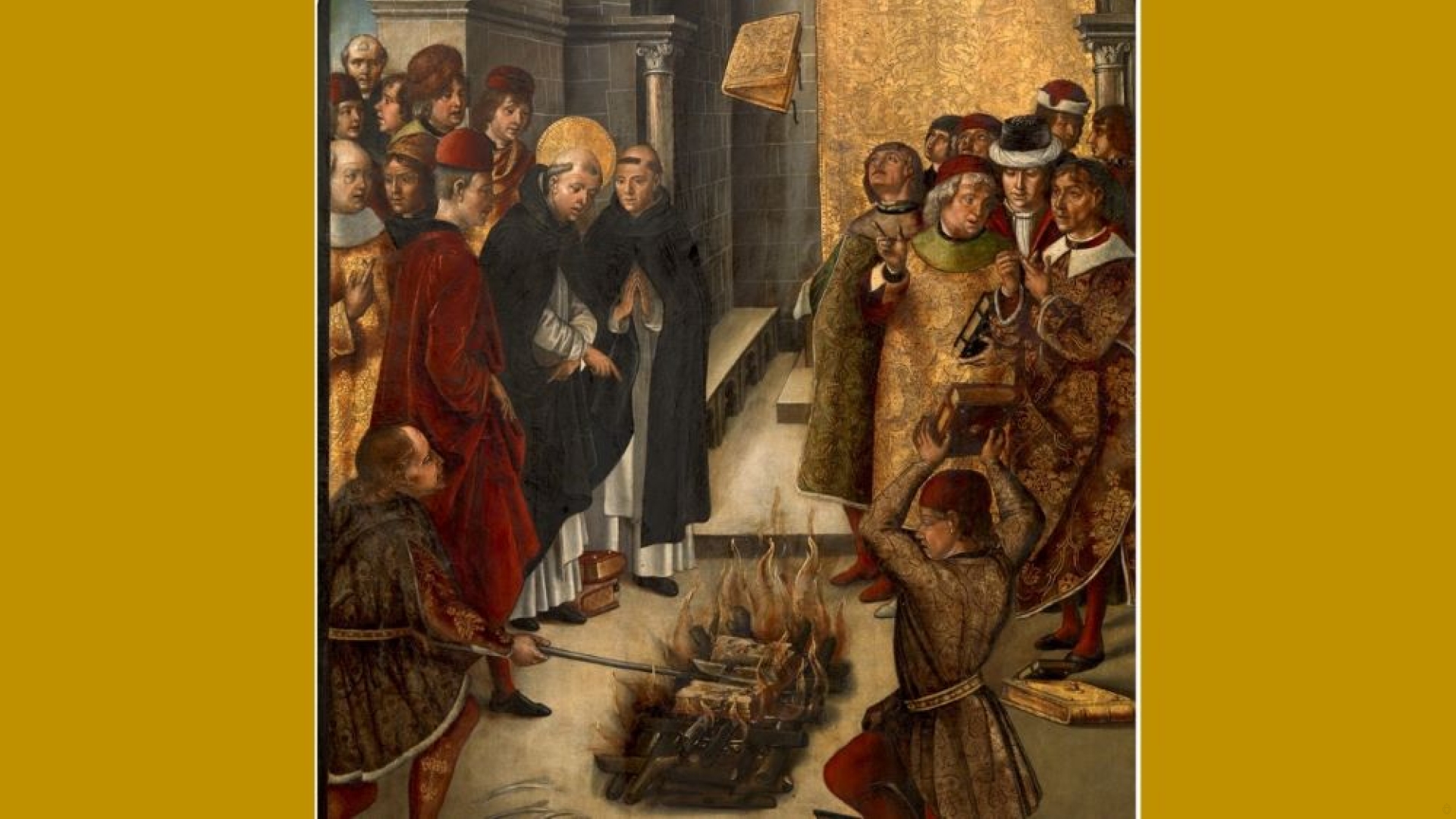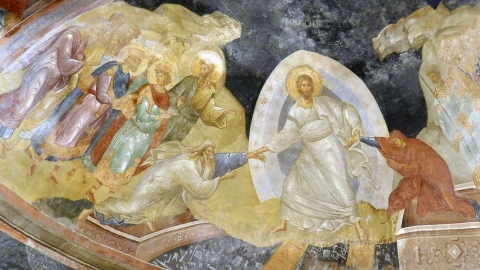The Albigensian Crusade (4)

The Miracle of Fanjeaux: the Cathar books burn while those of St. Dominic rise above the fire
This text is an extract from the apologetic work of Jean Guiraud, Histoire partiale, histoire vraie (Beauchesne editions, 1912). Jean Guiraud dismantles piece by piece the false arguments of anticlericalism. A chapter is devoted to the Crusade against the Albigensians. The first part summarized the arguments of the anticlerics and showed their contradictions. The second, third, and fourth examine the doctrine of the Albigensians.
After considering the morality of Albigensianism and its negation of marriage, we must note its social and political doctrines.
Negation of Social Sanctions and Patriotism
The other commitments made by the heretics when they joined the sect ran counter to the social principles on which the constitutions of all states are based.
They promised, on the day of their initiation, not to take any oath, because, as all the Cathar sects taught, “we must not take an oath.” Currently, there are philosophical and religious sects which reject the taking of oaths with the same energy and we know all the difficulties to which they give rise in a society which, despite its secularization, still involves utilizing oaths as part of the most important acts of social life.
What otherwise profound troubles such doctrines would bring to the states of the Middle Ages, where all the relations of men with each other, of subjects with their sovereigns, vassals with their overlords, of citizens of the same city, of members of a confraternity with each other, were guaranteed by an oath, where finally all authority derived its legitimacy from as oath?
It was one of the strongest bonds of the social body that the Manicheans destroyed in this way, and in so doing, they looked like true anarchists. They really were anarchists when they denied society the right to shed blood in defense against enemies within and without, invaders and evildoers.
They took literally and in its most rigorous sense, the word of Christ, declaring that whoever kills with the sword must perish by the sword, and they deduced from this the absolute prohibition not only against murder, but also against any killing for whatever reason.
From this principle flowed the most serious social consequences, and in their formidable logic, the Albigensians did not shrink from them.
Any war, even just in its causes, became criminal through the killings it necessitated: the soldier defending his life on the battlefield, after having armed himself for the defense of his country, was a murderer, just like the more vulgar of criminals; because nothing could authorize him to shed human blood.
No more than the soldier in the heat of battle, neither did judges, nor the other custodians of public authority in their seats have any right to pass death sentences. “God did not want, said the Albigensian Pierre Garsias, for the justice of men to be able to condemn someone to death”; and when one of the followers of heresy became consul of Toulouse, he reminded him of the rigor of this principle.
Did the 13th century heretics deny society any right to punish? It is difficult to say, because if most of them seemed to say it by proclaiming “that one must in no way do justice, that God does not want justice,” others did not fail to restrict this absolute negation to capital sentences, “by condemning someone to death.”
The latter, however, appears to us as politics, mitigating the rigor of the precept by clever restrictions. The Summa Gentiles tells us in fact that all sects taught “that there should be no punishment, nor should justice be done by man”; which seems to indicate that the pure Cathar doctrine absolutely denied society the right to punish.
In any case, by the absolute prohibition of oaths and of war, by the restrictions of the laws of justice, the Albigensians made difficult the existence and the preservation, not only of the society of the Middle Ages, but also of any society; and it is understandable that the Church has tirelessly denounced the danger that their doctrines could pose to humanity.
“We must admit,” says the author of Additions to the History of Languedoc, “that the principles of Manichaeism and those of the heretics of the 12th and 13th centuries, attacking the very foundations of society, were to produce the strangest, the most dangerous disturbances, and shake forever laws and political society.”
These are the heretics whom Aulard and Debidour represent as simple reformers of Christianity, Gauthier and Deschamps present as “simple and peaceful people,” and Guiot and Mane present as harmless and gentle men dreaming only of poetry.
Mr. Lea, in his History of the Inquisition, understood them better. Although Protestant and an enemy of the Church, he saw that the nihilism of the Albigensians marked a return to barbarism, while Christian doctrine represented civilization and progress.
The victory of the Albigensians was the unleashing of the most terrible fanaticism since it gave glory to man to commit suicide and a duty to the family to dissolve. By combating them, the Catholic Church defended, with the truth of which it is the depositary, the cause of life, of progress, and of civilization.
This is what the documents repeat in every way to these historians without a conscience who paint a fanciful and false portrait of the Albigensians, the better to pose them as innocent victims of the Church.
(Sources : MG Thomatique - FSSPX.Actualités)
Illustration : Pedro Berruguete, Domaine public, via Wikimedia Commons





